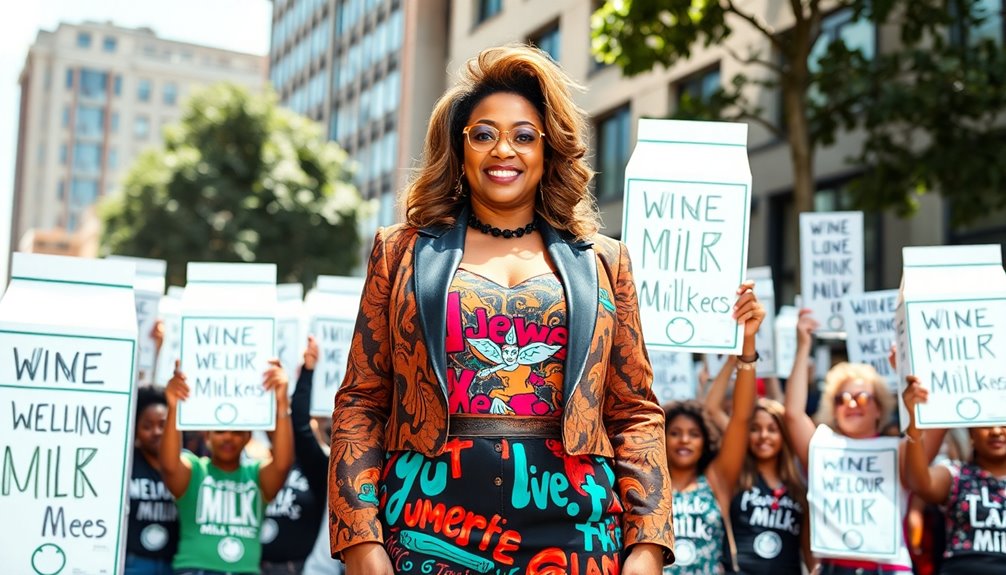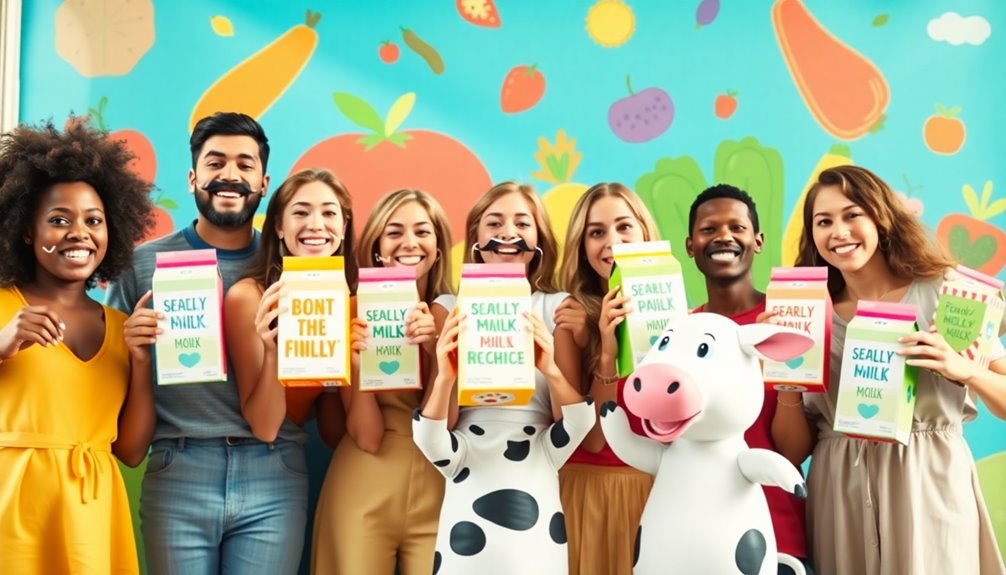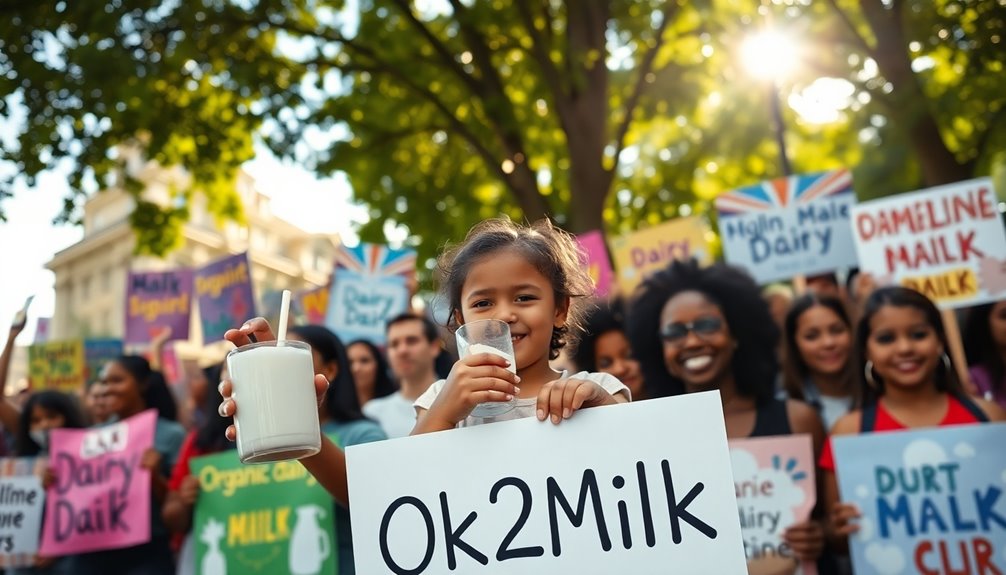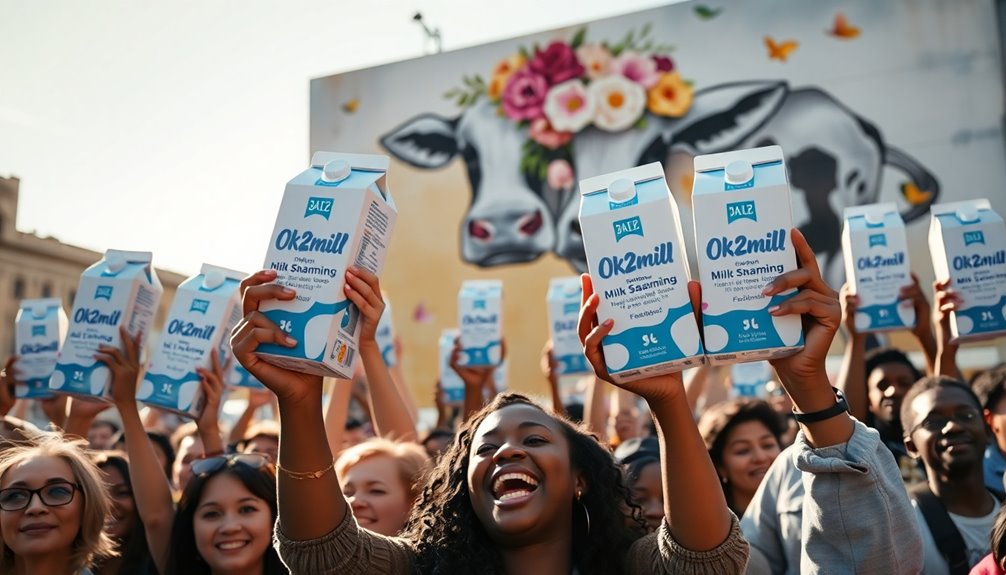Join the Ok2Milk movement and stand against milk shaming! This campaign, fronted by Queen Latifah, uses humor and relatable messages to celebrate dairy and shift public perceptions. You're not alone if you enjoy milk; 92% of American households do too! Resources and support are available at OK2Milk.org, including a hotline for guidance. The campaign also addresses ethical concerns in dairy farming while promoting the nutritional benefits of milk. With its engaging approach, Ok2Milk aims to create a community of dairy lovers. Stay tuned to learn how you can support this vibrant initiative and make a difference!
Key Takeaways
- The Ok2Milk campaign, supported by Queen Latifah, promotes inclusivity and combats the stigma surrounding dairy consumption through humorous and relatable ads.
- With 92% of American households still drinking dairy milk, the campaign aims to strengthen consumer confidence amid rising plant-based alternatives.
- The movement emphasizes the nutritional benefits of dairy while addressing ethical concerns in farming and environmental impacts to resonate with health-conscious consumers.
- Resources like OK2Milk.org and a dedicated hotline provide support and educational materials for dairy enthusiasts, fostering a supportive community.
- Engaging younger audiences, especially Gen Z, is crucial as they increasingly shift towards plant-based options; the campaign encourages embracing dairy's role in diverse diets.
Overview of the Ok2Milk Campaign

As the trend of "milk shaming" grows, the Ok2Milk campaign steps in to support those who love dairy milk. Funded by the Milk Processor Education Program (MilkPEP), this initiative takes a stand against the ridicule dairy milk drinkers face.
Through humorous ads narrated by Queen Latifah, Ok2Milk addresses the stigma surrounding milk consumption, making it relatable and enjoyable for a broader audience. You can find additional resources at OK2Milk.org or call the hotline (1-888-OK2-MILK) for community support.
With a focus on inclusivity, Ok2Milk aims to shift public perception and celebrate dairy milk amid changing dietary trends, encouraging everyone to embrace their love for this classic beverage without fear of judgment.
Role of Queen Latifah

Queen Latifah's role as the spokesperson for the Ok2Milk campaign brings a powerful celebrity influence to the message.
By using her humor and charm, she encourages dairy drinkers to embrace their choices with pride.
Her connection with younger audiences helps challenge the stigma and promotes a supportive community for milk lovers.
Celebrity Influence on Campaign
While many campaigns struggle to resonate with younger audiences, the OK2Milk initiative has harnessed the cultural influence of Queen Latifah to effectively promote a positive image of milk consumption. As a Grammy and Emmy award-winning artist, she connects with fans while addressing milk shaming and emphasizing community support. Her comedic public service announcement encourages dairy drinkers to embrace their choices proudly. Decluttering one's mindset by letting go of emotional attachments can also empower individuals to make healthier lifestyle choices.
| Aspect | Queen Latifah's Role | Impact on Campaign |
|---|---|---|
| Celebrity Influence | Face of the OK2Milk campaign | Boosts visibility |
| Public Awareness | Highlights milk shaming | Normalizes dairy consumption |
| Community Support | Encourages unity among drinkers | Fights cultural stigma |
| Industry Alignment | Supports dairy industry | Engages diverse audiences |
Emphasizing Dairy Drinkers' Pride
Despite the rising trend of milk shaming, the OK2Milk campaign, with its vibrant messaging and humor, encourages you to take pride in your choice to drink dairy. The campaign highlights the nutritional benefits of milk, showcasing its role in a balanced diet while promoting positive dairy consumption experiences. With catchy slogans and engaging visuals, it invites individuals of all ages to embrace their love for milk without guilt. So, join OK2Milk’s movement against shaming and celebrate the joy of dairy in your everyday life!
Queen Latifah, a celebrated artist and avowed milk drinker, stands at the forefront of this movement, using her influence to support dairy drinkers everywhere.
- She humorously addresses the ridicule faced by those who love milk.
- Her relatable content fosters community among dairy drinkers.
- With her help, the campaign aims to normalize dairy consumption amidst backlash.
- By promoting self-improvement and personal growth, the campaign empowers individuals to embrace their love for milk confidently.
Understanding Milk Shaming

As you navigate the modern landscape of dietary choices, you may encounter milk shaming—a phenomenon where dairy drinkers face mockery and derision for their beverage preferences. Despite a decline in dairy milk consumption, 92% of American households still enjoy it. Social media amplifies this stigma, making it harder for many to feel proud of their choice. The OK2Milk campaign stands as a beacon of support, addressing cultural stigma and offering resources like a hotline (1-888-OK2-MILK) and a website (OK2Milk.org) to connect with others facing similar challenges.
| Aspect | Impact on Dairy Drinkers | Support Offered |
|---|---|---|
| Social Media | Increased ridicule | Community connections |
| Cultural Stigma | Feelings of embarrassment | Educational resources |
| MilkPEP Efforts | Advocacy for acceptance | Hotlines and websites |
Marketing and Humor Strategy

The Ok2Milk campaign effectively leverages humor to engage audiences, making the conversation around dairy consumption more relatable and enjoyable. By using satirical ads that showcase exaggerated scenarios of milk drinkers facing ridicule, it highlights the absurdity of milk shaming.
- Celebrity endorsement by Queen Latifah adds credibility and targets younger demographics.
- The marketing strategy emphasizes cultural moments, aiming to normalize and celebrate milk drinking.
- Relatable content fosters a supportive community for those who enjoy dairy despite societal pressures.
This humor-driven approach not only combats milk shaming but also aligns with current trends in brand marketing that prioritize engagement and cultural relevance, proving that laughter can be a powerful tool in reshaping perceptions around dairy consumption. Additionally, emotional intelligence plays a crucial role in fostering connections and understanding among consumers who engage with the campaign.
Support Resources for Consumers

Support resources for consumers facing milk shaming are essential to fostering a positive community around dairy consumption.
The OK2Milk campaign offers immediate support through a hotline at 1-888-OK2-MILK, where you can get help and resources. By visiting OK2Milk.org, you'll find a hub filled with humor and educational content about milk's nutritional benefits, empowering you to embrace your choices confidently.
Queen Latifah's comedic public service announcement adds a fun touch, reminding you to celebrate dairy consumption without embarrassment.
Plus, your purchases of OK2Milk merchandise contribute up to $10,000 to STOMP Out Bullying, promoting inclusivity.
Together, these support resources create a welcoming environment for everyone who enjoys milk. Additionally, the campaign emphasizes that milk is a source of essential nutrients like calcium and vitamin D, which are important for healthy living.
Ethical Concerns in Dairy

While many enjoy the benefits of dairy, ethical concerns surrounding its production can't be ignored. As a consumer, you may find yourself questioning the implications of your milk consumption.
Dairy deniers highlight several key issues:
- Calf separation, causing distress for mothers and calves alike.
- Health problems in cows, such as mastitis and lameness, from intensive farming practices.
- Significant environmental impact, including greenhouse gas emissions and excessive water usage.
With growing awareness of these ethical concerns, many are turning to plant-based alternatives. This shift is especially prominent among younger generations who prioritize sustainability and humane food sources.
Industry Response and Challenges

You've likely noticed the decline in dairy sales as more people, especially younger generations, choose plant-based options.
This shift in consumer preference poses real challenges for the dairy industry, pushing them to adapt their marketing strategies.
To win back trust and highlight the benefits of traditional dairy milk, campaigns like Ok2Milk have emerged as essential tools in this fight.
Declining Dairy Sales
As consumer preferences shift towards health-conscious and sustainable options, the dairy industry faces significant challenges in maintaining its market presence.
You're not alone if you're one of the milk drinkers facing tough dairy decisions or even canceled plans for traditional milk.
- Declining milk consumption has hit demographics like Gen Z the hardest, dropping by 20% compared to the national average.
- The rise of plant-based milks continues to erode dairy sales, forcing the industry to rethink its marketing strategies.
- Economic pressures, including farm closures, further complicate the landscape.
Despite 92% of American households still consuming dairy milk, the need for innovative support and entertainment strategies is essential to regain consumer trust and adapt to changing tastes. Additionally, embracing a growth mindset can help dairy brands pivot and respond effectively to these evolving consumer demands.
Consumer Preference Shift
With consumer preferences rapidly evolving, the dairy industry must confront significant challenges to retain its market share. The decline in dairy milk consumption, especially among Gen Z, reflects a broader consumer preference shift toward plant-based milk alternatives. Campaigns like OK2Milk aim to combat milk shaming and promote the benefits of dairy.
| Consumer Group | Dairy Milk Consumption (%) |
|---|---|
| General Market | 92 |
| Gen Z | 80 |
| Millennials | 85 |
| Gen X | 90 |
| Baby Boomers | 95 |
Despite a 20% decrease in Gen Z's dairy consumption, the dairy industry still has a substantial market to engage. Addressing economic pressures while promoting dairy's value will be essential for future success. Additionally, many consumers are increasingly aware of the health benefits of cold-pressed vegetable juice, which could impact their beverage choices.
Marketing Adaptation Strategies
Recognizing the urgent need to adapt, the dairy industry is launching innovative marketing strategies to combat declining milk consumption and the rise of plant-based alternatives.
The Ok2Milk initiative, featuring Queen Latifah, aims to normalize dairy milk and tackle milk shaming through humor and relatable content.
Here's how they're responding:
- Emphasizing the nutritional benefits of traditional milk to appeal to health-conscious consumers.
- Targeting Gen Z, who've seen a 20% decline in dairy consumption, with engaging campaigns.
- Exploring collaborations and fresh techniques to stay competitive as the plant-based market grows.
These marketing strategies are vital for the dairy industry to regain relevance and counteract the negative perceptions surrounding milk consumption. Proper nutrition is essential for children's cognitive development, reinforcing the importance of including dairy as a nutrient-rich option in their diets.
Future of Dairy Marketing

While the dairy industry faces challenges from rising plant-based alternatives, it's clear that innovative marketing strategies will shape the future of dairy consumption.
Milk processors are stepping up their game, utilizing social media to combat milk shaming and connect with consumers. Campaigns like Ok2Milk.org showcase relatable content that resonates with younger generations, addressing their concerns about health and sustainability.
By employing humor and cultural relevance, dairy marketing can engage those exploring non-dairy options while reminding traditional consumers of the benefits of dairy. Additionally, fostering an abundance mindset can encourage consumers to appreciate the value of dairy in their diets.
With 92% of American households still consuming dairy milk, targeted strategies can effectively bridge the gap and foster a supportive community around dairy consumption, ensuring its place in a diverse marketplace.
Frequently Asked Questions
What Is Milk Shaming?
Milk shaming is the act of ridiculing or criticizing people for choosing to drink dairy milk.
You might notice it happening on social media, in schools, or even at coffee shops.
This cultural stigma can make you feel embarrassed about your choice, especially as plant-based alternatives gain popularity.
It's important to remember that your preferences are valid, and you shouldn't feel ashamed of enjoying dairy milk in a world filled with diverse options.
Why Was Milk Pushed in the 90S?
In the swirling tide of the 90s, milk was the shining knight, battling declining sales with the "Got Milk?" campaign.
You saw celebrities donning milk mustaches, showcasing its strength like a superhero.
With over $200 million invested each year, the focus was on milk's nutritional prowess—calcium and vitamin D, the backbone of bone health.
This powerful push momentarily steadied milk's place on your table, even as alternatives began to creep in.
Conclusion
As you join the Ok2Milk movement, imagine standing tall against the tide of milk shaming. With Queen Latifah leading the charge, you're not just sipping your favorite beverage; you're embracing a culture of acceptance. Picture a future where dairy isn't demonized but celebrated, where laughter replaces judgment. The dairy industry's response is uncertain, but your support can tip the scales. Will you be part of this vibrant revolution, transforming perceptions one glass at a time? The choice is yours.
In the vast and diverse world of coffee, coffee alternatives, and tea, Olivia has found her calling. As an author and a dedicated coffee and tea aficionado, her work for Cappuccino Oracle reflects her profound love and understanding of the intricate complexities found within these beverages. Olivia’s passion for the subject serves as both a catalyst for her creativity and a connection point with her audience.










